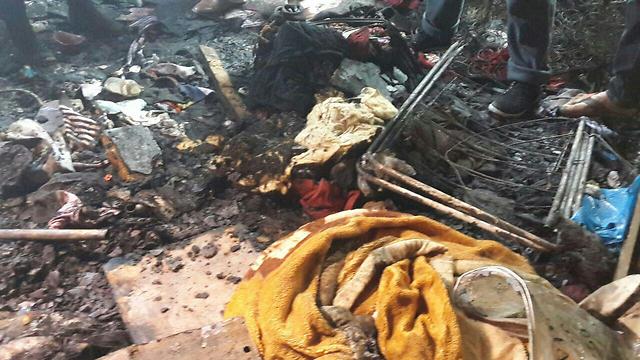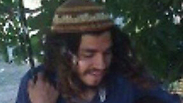
Indictments filed against two Duma arson suspects, gag order lifted
Amiram Ben-Uliel, 21, and another minor indicted for murder and involvement in the murder of three members of Dawabsheh family.
Amiram Ben-Uliel, 21, from Jerusalem, and a 17-year-old youth from the Samaria region were indicted on Sunday morning for murder and involvement in the murder of the three members of the Dawabsheh family at the Palestinian village of Duma in late July.
Ben-Uliel was charged with three counts of murder, two counts of attempted murder, two counts of arson, and one count of conspiring to commit a nationalistically-motivated crime.
The 17-year-old, whose name cannot be reported because he is a minor, was charged with one count of conspiring to commit a nationalistically-motivated crime. He is also suspected of involvement in the arson at Dormition Abbey.
Yinon Reuveni, 20, and another minor were charged for other violence against Palestinians.
According to the indictment, Ben-Uliel and the minor, who were living on and off in outposts near Duma at the time, conspired during the month of July 2015 to avenge the murder of Malachi Rosenfeld by Palestinian terrorists.
The two met several times at the outposts of Geulat Zion - where the Ben-Uliel resided at the time - and Yishuv HaDa'at, to plan their attack, the indictment says.
They also conducted reconnaissance of the villages of Duma and Majdal Bani Fadil and decided to first target Duma and if they are able, commit an attack in Majdal Bani Fadil as well.
According to the indictment, Ben-Uliel prepared two bottles filled with flammable liquid, rags, a lighter, a box of matches, gloves, and a can of black spray paint to be used in the attack.
The two set to meet at a cave in Yishuv HaDa'at before leaving for Duma on the night of the attack, July 30, 2015, but for an unknown reason failed to meet each other there.
After waiting for the minor suspect for an hour at the cave, Ben-Uliel, dressed in dark clothes and carrying the items prepared for the attack in a bag, set out in the direction of Duma.
When arriving in Duma at around 11pm, Ben-Uliel used one of the two dark shirts he was wearing to cover his face, and put on his gloves.
According to the indictment, he chose a house in the heart of the village, rather than one on the outskirts, to further bolster the effect of fear and terror among the residents. He sought out a house with signs of being inhabited to ensure he does not set fire to an abandoned home.
Ben-Uliel chose to target two homes belonging to the Dawabsheh family - one housing Saed, Reham, Ahmad and Ali, and the other owned by Mamoun Dawabsheh, with the latter house being empty.
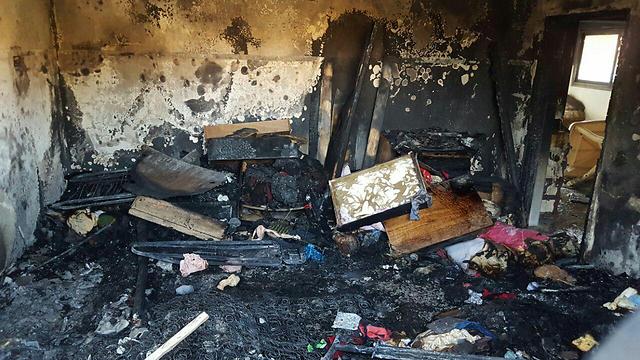
He set Mamoun's empty house on fire with one of the Molotov cocktails, after spraying the word "Revenge" and drawing a Star of David on the wall of the house. He also sprayed the words "Long Live the King Messiah" and drew a crown on the wall surrounding the homes. Mamoun's house burned down as result of the arson.
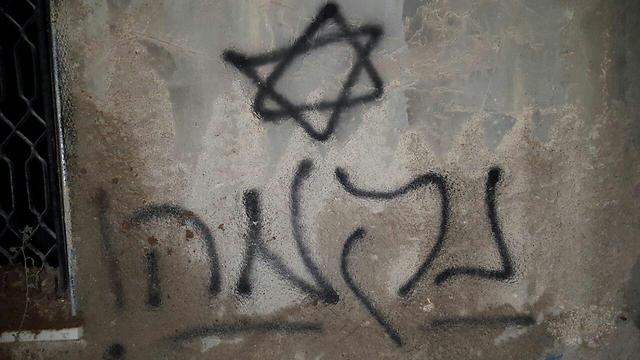
Ben-Uliel then turned to Saed and Reham Dawabsheh's home, where, after failing to open two windows, he managed to open the window of the bedroom, where the entire family was sleeping, and hurled the second Molotov cocktail inside. He then fled the scene.
All four members of the Dawabsheh family caught on fire. Saed and Reham were able to escape the house, the child Ahmad managed to reach the door of the home, while baby Ali was left in his bed inside the burning house.
Neighbors who arrived at the scene took the parents and Ahmad to the hospital in critical condition, all suffering from extensive burns. Ali could not be rescued from the burning house until firefighters arrived at the scene and put out the fire.
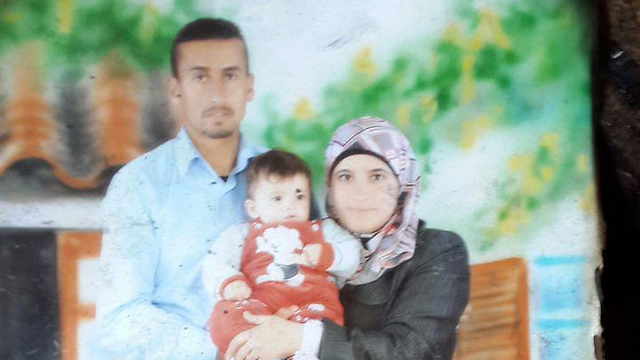
Ali Dawabsheh, 18 months old, died in the fire. His father Saed succumbed to his wounds eight days after the attack, while his mother Reham died after five weeks. His brother Ahmad, four years old at the time, suffered 2nd and 3rd degree burns to 60 percent of his body, has undergone several operations, and has been recovering at the Sheba Medical Center in Tel HaShomer over the past five months.
Hussein Dawabsheh, the grandfather of Ahmad and Ali, said the indictment against the two suspects was not enough. "It's true that they got a lead, but this terror attack was committed by other people as well. It can't be that only two people committed this attack, two people can't do something this big. You need a group, not one or two people," he said.
"I'm sure there are people who are involved in this attack and they're still free."
Shortly after the murder in Duma, the commander of the Judea and Samaria Police, Maj.-Gen. Shlomi Michael, said at the scene of the attack that "we will invest all efforts and resources at our disposal to uncover the identity of the perpetrators."
After the indictments against the suspects have been filed, police officials stated that "Today, a complex investigation led by the Israel Police, the Shin Bet, and the State Attorney's Central District, is coming to an end. This is an investigation that required a lot of resources and coordination between all of the law enforcement authorities in the State of Israel. As part of the investigation, dozens of suspects have been arrested - both adults and minors - who are suspected of being involved in the (Duma) attack and in other nationalistically-motivated crimes committed in recent years."
The solving of the arson in Duma is part of a larger investigation, one of the most significant conducted against Jewish terrorism in recent years. The Shin Bet and police say the suspects are part of an extreme, violent and dangerous Jewish terror organization that could at any moment perpetrate a terror attack against Palestinians, similar to the arson in Duma.
At first, investigators thought they were dealing with "price tag" activities of the kind they have been accustomed to seeing, but later realized these attacks were perpetrated by a radical group dubbed the "Revolt Group." The group's main objective is to cause chaos in Israel that would lead to the fall of the government and to the crowning of a king. The group seeks to do that by undermining Jewish-Arab relations, as well as Israel's standing in the world.
Investigators identified the 'Baladim outpost' near the settlement of Kokhav HaShahar in the Binyamin area as the hilltop youth's stronghold.
The hilltop youth, who usually arrived at the outpost at the urging of friends, have left educational institutions all over the country. During the day, the teenagers would pass the time doing odd jobs like construction, shepherding, ect. At night, they would gather at the outpost, where investigators believe they planned "price tag" attacks.
Security forces conducted raids, eavesdropping and frequent arrests, barred suspects from entering the West Bank using administrative orders, and put some of the suspects on administrative house arrest. In the months before the suspects in the arson were arrested, some 70 youths were barred from the West Bank.
During the interrogation of the suspects, their family members alleged that the Shin Bet was torturing them to extract a confession. The Shin Bet rejected the accusations, stating the members of the Jewish terror organization committed serious attacks "out of a radical and anti-Zionist ideology."











